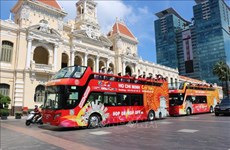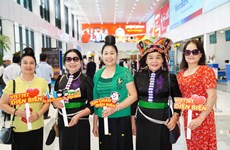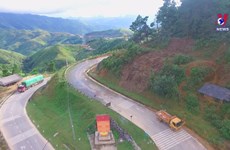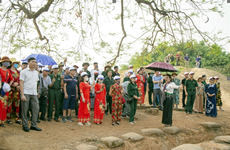Eco-tours offer green experience to visitors
Local residents offer tourism services and visitors can turn into
fishermen – that’s the ethos on the eco-tours initiated in 2006 by Hoian
Eco-tour Director Tran Van Khoa, who was born into a fishing family and
used to work in Hoi An’s Victoria Hotel as a receptionist.
Local residents offer tourism services and visitors can turn into
fishermen – that’s the ethos on the eco-tours initiated in 2006 by Hoian
Eco-tour Director Tran Van Khoa, who was born into a fishing family and
used to work in Hoi An’s Victoria Hotel as a receptionist.
A coracle (type of small boat) is dropped into the sea and Khoa skilfully jumps aboard. He then explains to the tourists onboard that local fishermen use coracles to catch fish and squid offshore.
He demonstrates how to steer it through the waves and receives a clap from five year old Ally Chris from Singapore .
Other members of the group are invited to try rowing the coracle. Many of them are intrigued by the local fishing methods. Little Ally’s mother, Elliott, insists on trying to cast a net into the sea. She draws it back with only weeds, but she looks delighted, saying: "I have now learnt how to net fish."
It is not difficult to find a coracle or a buffalo on the Internet but if someone wants to experience both interesting and exiting feelings when he/she tries the coracle or rides a buffalo they need to have some experiences, said Erica Rubbs, who is working for a non-governmental organisation in Myanmar , after joining the eco-tour.
Every day, Khoa takes tourists on cruises to try the coracles. They also visit the Bay Mau palm forest, where soldiers sheltered in their fight against US invaders. Later they can enjoy seafood delicacies served up by Khoa’s father.
Khoa also co-ordinates with the five-star Victoria Hotel to offer special eco-tours, where tourists are encouraged to join in clean-up activities in Bay Mau palm forest.
"Eco-tourism is associated with no pollution, greenery and beauty," said Khoa, "There is too much rubbish in the rivers, along the beach and in the forest. All my customers are willing to join in a 15-minute clean-up and even the other tours pick up rubbish to put in the bins on the boats." Within a day, the tourists can experience farming techniques in Tra Que vegetable village and then ride bicycles to Cuu Dai beach and try fishing from Cua Dai Fishing Wharf .
"It’s an excellent way to see the countryside and meet the people," wrote Tarja Halonen, President of Finland , who took a tour in February in 2008, together with her husband and their bodyguard.
Khoa’s eco-tours have resulted from his own initiative and his whole family and neighbours have helped. After graduating in English from Da Nang College , Khoa worked in the Victoria Hotel . He soon realised that foreign tourists were interested in his fishing village and its surrounding natural beauty.
So he started the tour business with 100 million VND (over 5,000 USD) capital. He designed his own itineraries, and he was the sole guide, his father and mother help to gear up the boats and serve the food.
Now there are 10 guides who speak mainly English and French and around 30 fishermen provide and row coracles to serve big groups, earning up to 3 million VND (more than 150 USD) a month.
"Eco-tourism is successful, because it requires little investment, but results in a higher financial turnover.
"Our eco-tours are especially appreciated as Hoi An has beautiful scenery, many historic sites and hard-working, warm-hearted people," Khoa said.
The Business Traveller magazine has run an article to commend Tran Van Khoa and his company. Together with the rich cultural heritages, the efforts to preserve traditional values and environment is the certificate of the young man on his love for people and land in Hoi An where he was born and grew up, said the Asian Pacific tourist magazine.
Hoian Eco-tour has become a famous tourist trademark of Hoi An which received around 4,000 international tourists, making up around one-third of the total foreigners to the city in 2010./.
A coracle (type of small boat) is dropped into the sea and Khoa skilfully jumps aboard. He then explains to the tourists onboard that local fishermen use coracles to catch fish and squid offshore.
He demonstrates how to steer it through the waves and receives a clap from five year old Ally Chris from Singapore .
Other members of the group are invited to try rowing the coracle. Many of them are intrigued by the local fishing methods. Little Ally’s mother, Elliott, insists on trying to cast a net into the sea. She draws it back with only weeds, but she looks delighted, saying: "I have now learnt how to net fish."
It is not difficult to find a coracle or a buffalo on the Internet but if someone wants to experience both interesting and exiting feelings when he/she tries the coracle or rides a buffalo they need to have some experiences, said Erica Rubbs, who is working for a non-governmental organisation in Myanmar , after joining the eco-tour.
Every day, Khoa takes tourists on cruises to try the coracles. They also visit the Bay Mau palm forest, where soldiers sheltered in their fight against US invaders. Later they can enjoy seafood delicacies served up by Khoa’s father.
Khoa also co-ordinates with the five-star Victoria Hotel to offer special eco-tours, where tourists are encouraged to join in clean-up activities in Bay Mau palm forest.
"Eco-tourism is associated with no pollution, greenery and beauty," said Khoa, "There is too much rubbish in the rivers, along the beach and in the forest. All my customers are willing to join in a 15-minute clean-up and even the other tours pick up rubbish to put in the bins on the boats." Within a day, the tourists can experience farming techniques in Tra Que vegetable village and then ride bicycles to Cuu Dai beach and try fishing from Cua Dai Fishing Wharf .
"It’s an excellent way to see the countryside and meet the people," wrote Tarja Halonen, President of Finland , who took a tour in February in 2008, together with her husband and their bodyguard.
Khoa’s eco-tours have resulted from his own initiative and his whole family and neighbours have helped. After graduating in English from Da Nang College , Khoa worked in the Victoria Hotel . He soon realised that foreign tourists were interested in his fishing village and its surrounding natural beauty.
So he started the tour business with 100 million VND (over 5,000 USD) capital. He designed his own itineraries, and he was the sole guide, his father and mother help to gear up the boats and serve the food.
Now there are 10 guides who speak mainly English and French and around 30 fishermen provide and row coracles to serve big groups, earning up to 3 million VND (more than 150 USD) a month.
"Eco-tourism is successful, because it requires little investment, but results in a higher financial turnover.
"Our eco-tours are especially appreciated as Hoi An has beautiful scenery, many historic sites and hard-working, warm-hearted people," Khoa said.
The Business Traveller magazine has run an article to commend Tran Van Khoa and his company. Together with the rich cultural heritages, the efforts to preserve traditional values and environment is the certificate of the young man on his love for people and land in Hoi An where he was born and grew up, said the Asian Pacific tourist magazine.
Hoian Eco-tour has become a famous tourist trademark of Hoi An which received around 4,000 international tourists, making up around one-third of the total foreigners to the city in 2010./.













